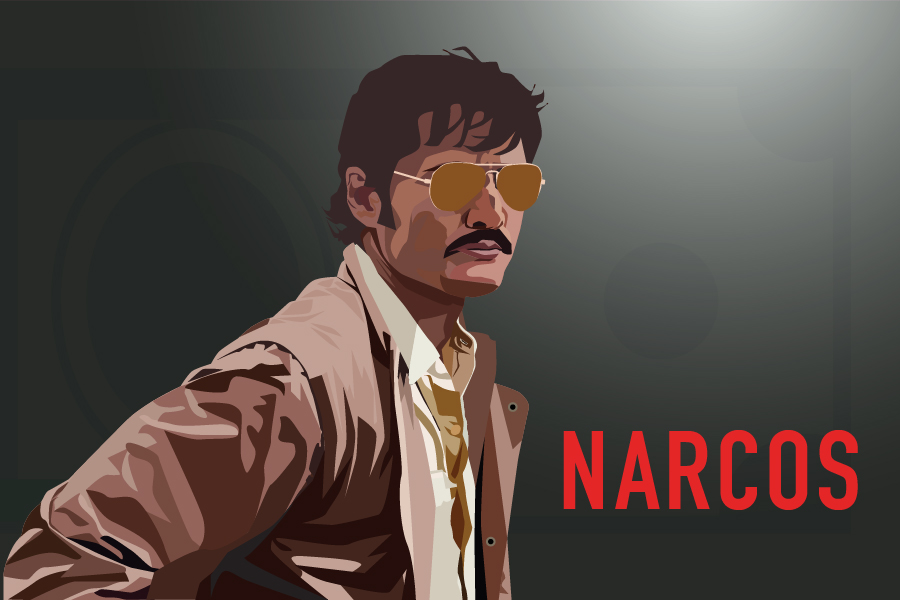
How broader culture has grown to love cartels
 This article contains major spoilers for the Netflix show “Narcos.”
This article contains major spoilers for the Netflix show “Narcos.”
Television and news have consistently been complacent in glorifying and packaging narco culture for viewer consumption. This is most readily evident in “Narcos,” the popular Netflix series, which glamorizes drug use and cartel violence and at times makes the viewers sympathize with Pablo Escobar’s character.
The final moments of “Narcos” Season 2 shows Escobar running for his life before he gets shot. Because the show humanized Escobar so intensely, I felt bittersweet watching this scene. Even though he ordered thousands of killings, I couldn’t help but feel sad for the man during his last moments. He lost everything.
Clearly, the media has an obsession with crime and violence. Hollywood has repeatedly shown mob bosses as heroes — just look at “The Sopranos” or “Scarface.”
Media depictions of narco culture blur the lines of reality and fiction for dramatization purposes. “Narcos” idolizes Escobar and cleanses his acts of violence through presenting his character as a family man. The show turned him into a martyr.
From an entertainment standpoint, I love “Narcos.” However, I am critical of how the show inaccurately frames many of the atrocities Escobar committed. Even Escobar’s son has criticized the show for depicting false truths — for “insulting the history of a whole nation.”
As a result, the viewers take these scenes as the truth. I’m guilty of this myself. Even though “Narcos” is a TV show, I couldn’t help but feel that it was at times a documentary — I learned about historical events of which I had no prior knowledge.
For this reason, “Narcos” has caused outrage for Colombians. It has spread misconceptions about the country and continues to repeat the same old stereotypes about Colombia — that cocaine is readily available and that there is still massive violence going on. “Narcos” and Pablo Escobar do not represent Colombia as a whole. These are antiquated notions that repeat the same harmful messages that have circulated for years.
Moreover, the media has an obsession with the dangerous aspect of cartel culture. The popularity of “Narcos” has only further increased hype around narco television series.
“El Chapo” is another Netflix show that focuses on the leader of the Sinaloa Cartel, Chapo Guzman. In this genre of television, there’s an overexposure to drug and cartel violence, and they only show the bad side of these countries while never showing the positive.
Moreover, it is important to talk about the prominence of how narco glorification has seeped into Mexican-American culture. According to Time, “narcocorridos” is “the name given to the traditional-sounding foot-stompers that chronicle the lives of the drug lords and their murderous henchmen.” Narcocorrido is a popular genre of music that idolizes cartels, drugs and violence.
I grew up listening to narcocorrido songs, and it wasn’t until I was in one of my Spanish classes, where we analyzed the genre, that I realized the messages these songs were sending.
The song “Contrabando y Traición,” by the popular band Los Tigres del Norte, mentions drugs, killings and abuse. Many artists in the narcocorrido genre explicitly talk about killing and doing drugs, while some songs even praise and support El Chapo.
Nonetheless, these super-famous artists in the narcocorrido genre exaggerate and even lie about their lifestyles. The same thing can be see in the U.S. music industry. Rapper Future has gone on record and “admitt[ed] that the stories he tells in his music aren’t always exemplary of his actual lifestyle.” Artists who sing about living these crazy, drug-filled lifestyles are merely putting on a show. I urge listeners and viewers of narco music and TV to be aware of fraudulent claims in the media, as these are constructed and packaged for consumption.
I want to see positive depictions of Hispanics for once. I’m tired of hearing and seeing the same stereotypes of narco culture being circulated with such popularity.
Written by: Alejandro Lara — amlara@ucdavis.edu
Disclaimer: The views and opinions expressed by individual columnists belong to the columnists alone and do not necessarily indicate the views and opinions held by The California Aggie.



